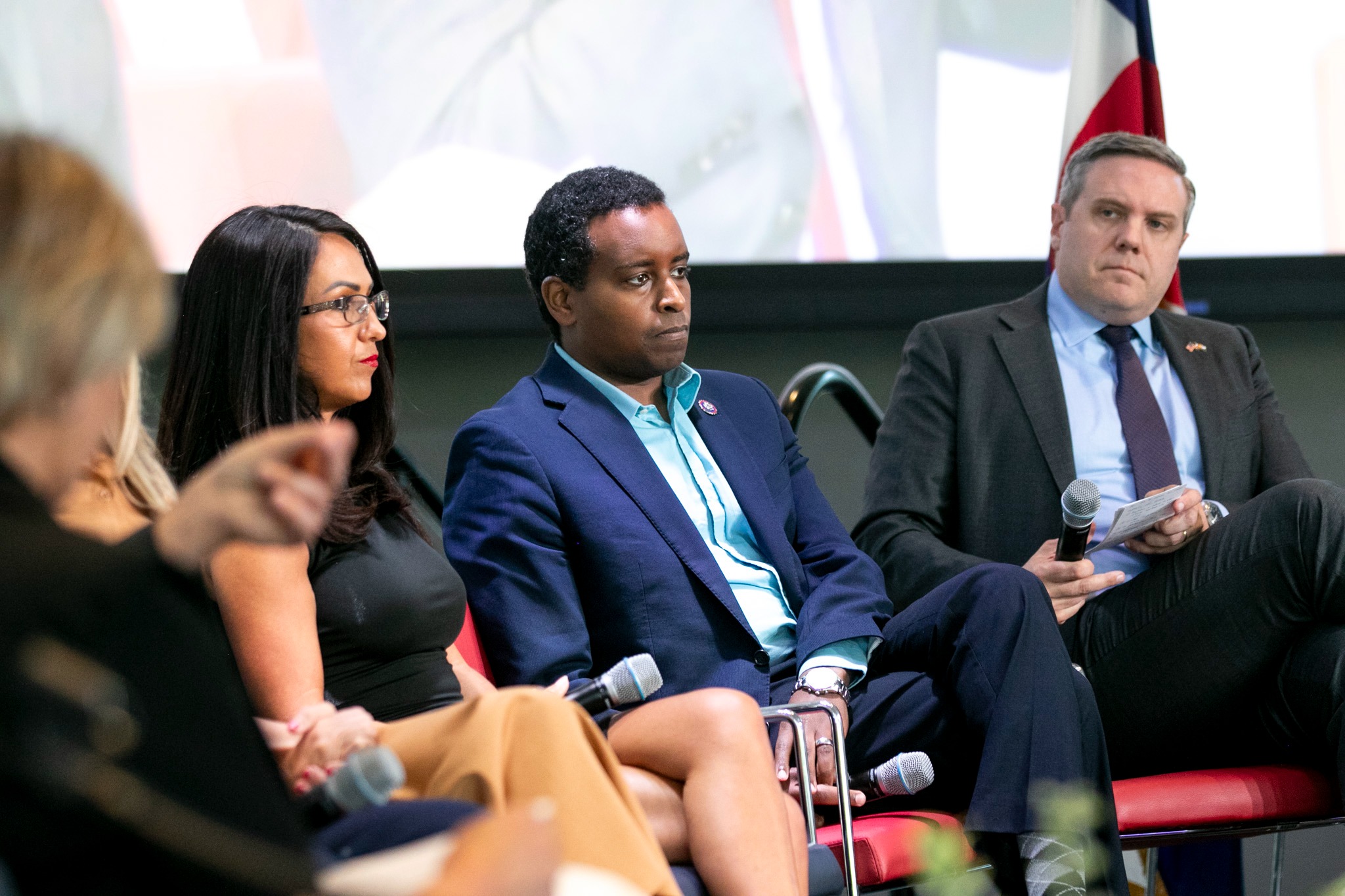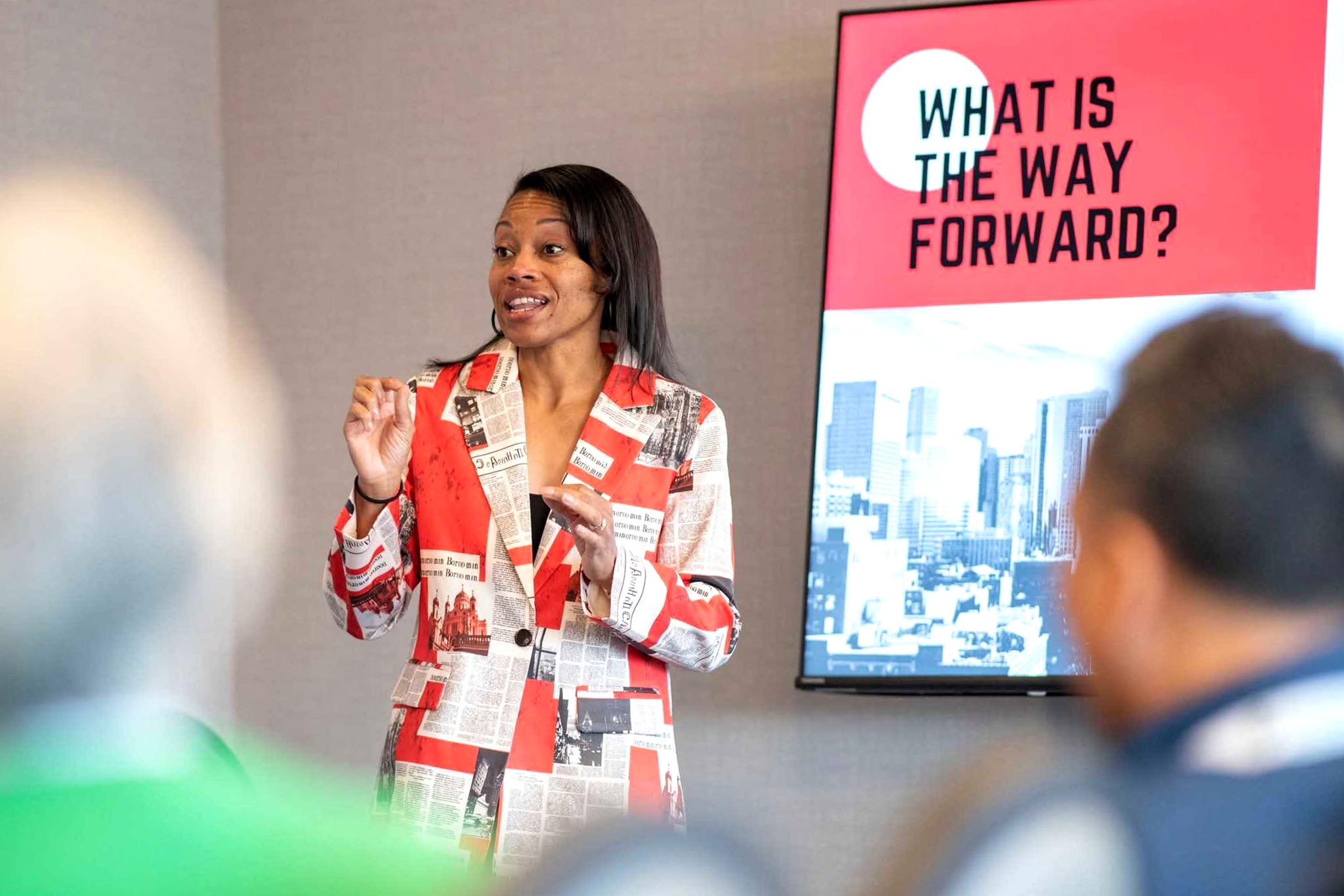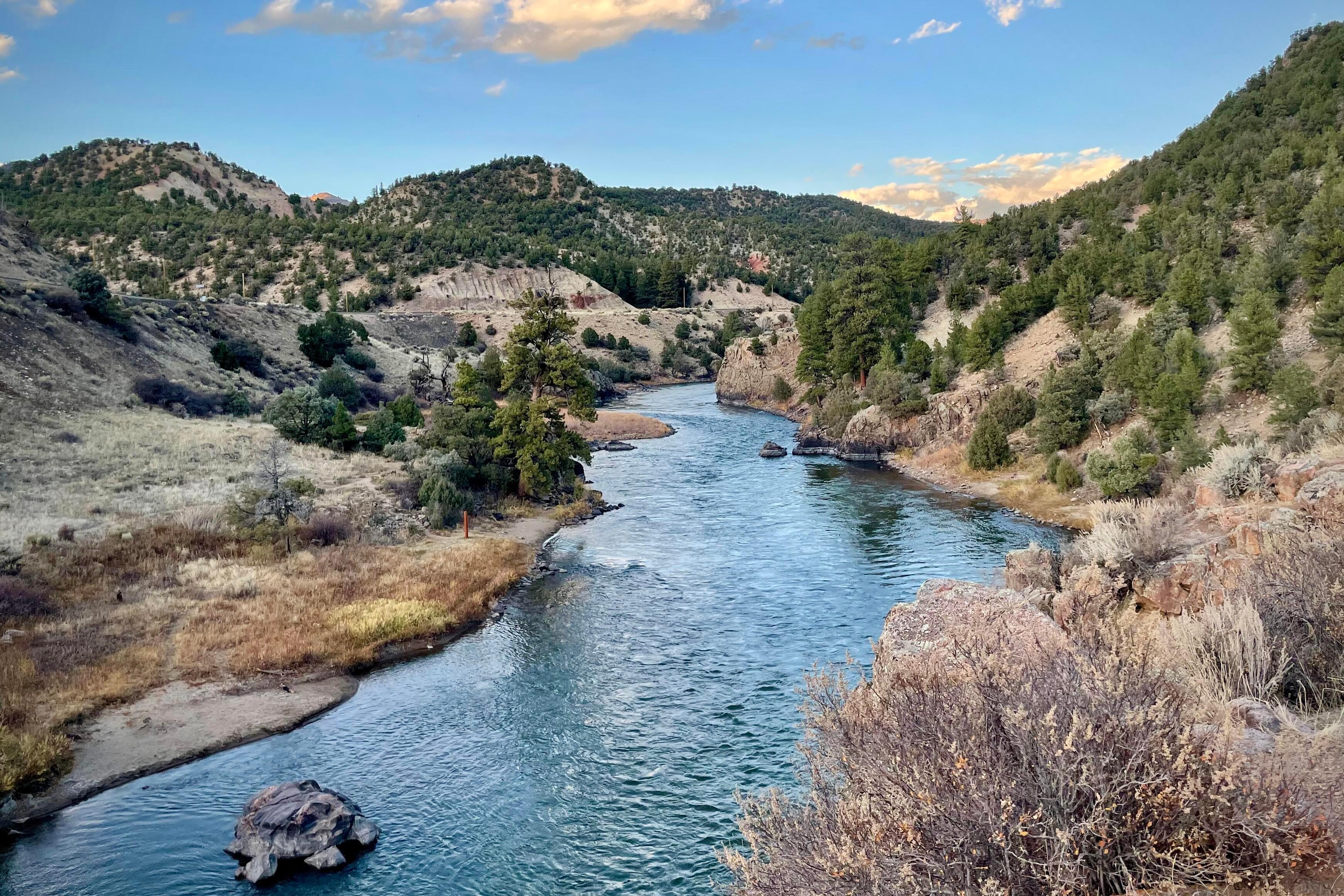

Six years ago, Arn Menconi worked to help Michael Bennet win his U.S. Senate seat. Now Menconi is running against the Democrat, on the Green Party ticket. His proposals include banning hydraulic fracturing, reducing the American military presence overseas and creating a national single-payer healthcare system.
Menconi served two terms, from 2000-2008, on the Eagle county commission as a Democrat. He joined the Green Party last year amid increasing disenchantment with U.S. foreign policy.
Menconi spent two decades running the Snowboard Outreach Society, now known as SOS Outreach, a nonprofit he founded to improve the then-negative public impression of snowboarding and to introduce inner-city youth to outdoor sports. He left the organization in 2014.
His recent work includes an audiobook based on interviews he conducted with Pentagon Papers leaker Daniel Ellsberg. Menconi spoke with Colorado Matters host Ryan Warner.
- Related: The Colorado Voter's Guide To The 2016 Election
- More Interviews: Bennet | Glenn | Menconi | Williams
Read the transcript:
Ryan Warner: Arn, welcome to Colorado Matters. Arn Menconi: Thank you for having me here, Ryan. Warner: A little bit more about you. You spent two decades running a non-profit that you founded called Snowboard Outreach Society. It mentors young people, many of whom live in poverty, gets them outdoors. You're the father of two, earned an MBA from the University of Denver. But I do want to start this political evolution. You served on the Eagle County commission from 2000 to 2008 as a Democrat and after that you stayed active in the party, as I said, lobbied Sen. Bennet on issues. What led you to break with the Democratic Party? Menconi: Well I campaigned for Bennet, I campaigned for Obama, I wanted to see wars ended. That's what Obama campaigned on and in July of 2014, Obama continued the war in Iraq. He's been bombing seven countries. He's bombed Doctors without Border hospitals. I tried to see if we could get an authorization for military force. They ignored the Constitution and we're in endless wars. So what got me involved is the realization that the Democratic Party and the Republican Party are basically the same party. There's the inside party and the outside party. We can't have endless wars. Then you take it into global warming and then inequality gap and then into racial injustice and you see that these parties are just facilitating what the corporate elites want. Warner: You talked about bombing Doctors without Borders hospitals. You're not saying intentionally there, though? Menconi: Well they changed their story three times over the weekend so I don’t know. They say it wasn't intentional. But look, here's what's intentional about what they're doing. They're intentionally lying. They're telling us that only 169 people were killed by drone attacks and the numbers are far outpacing that. They're telling us that we're in these wars to stop terrorism yet we're continuing to breed terrorism. So I don’t know what you call that but what I call that is a very covert action toward, that is immoral and I'm running for U.S. Senate because I feel as though our leaders, especially Michael Bennet in this election, is not speaking out against these wars. He's not, he's facilitating the way the oil and gas corporations are working in Colorado. He's not fighting to make sure that the banks were, the bankers were arrested for fraud. He's just taking five hours a day in order to raise somewhere around $14 million from Goldman Sachs, from the oil and gas industry, from big Pharma, from the healthcare industry, from lobbyists so that that he could have another six more years in order to do nothing. Warner: What's your source on five hours a day? Menconi: Well this is what representatives like [Rep. Steve] Israel, who has decided he's not going to run again, this is when I go to Washington, D.C. to try to talk to Sen.Udall and I'm told by one of his former staff people the reason he couldn't meet with you is because he's raising money and these guys spend five hours a day. Warner: Isn't that a reality of holding that office, given what the campaign finance rules are these days? Menconi: Well do you think Americans want their, to pay with their taxpaying dollars, $174,000 a year to representatives who are spending five hours a day raising tens of millions of dollars? That's not what I'm hearing when I go around the state and talk to citizens. They don't. When Michael Bennet stands up and says he wants to make sure that you get money out of politics, well I've got an answer for him: Don’t vote for people who are taking money from corporations. Warner: Let me say that Sen. Bennet has touted his support for the Disclose Act, which is campaign finance reform legislation. You mentioned earlier Israel, and that was a reference I think to Steve Israel, the representative from New York. Menconi: Yes, from New York. Warner: The Green Party has a detailed platform, structured around four core principles: democracy, social justice, ecological sustainability and economic justice and sustainability. We've a link to the full Green Party platform at cprnews.org. And I'd like to ask you about some of those points now. Your party supports a number of proposals that come with a potentially high price tag. For instance, a guaranteed minimum income that would put all Americans above the poverty line. And tuition free college or vocational school for all Americans. Do you embrace those policies and if so, how would you pay for them? Menconi: Yeah, in general I think how I'd pay for them is the most important part is as you've said before, I have an MBA from the University of Denver and I was a county commissioner and we ran a $100 million budget. The federal budget uses about 53 percent of their discretionary spending towards the military. That's about $620 billion each year and then there's a slush fund called the Overseas Contingency Operation Budget of almost another $60 billion that I see it as a trillion dollar budget when you add in security measures, the State Department, it's been reported at a trillion dollars. We could cut this budget by half. That's a half a bill, that's a half a trillion dollars. That's where you get the money for free college. That's where you can help find green jobs and do an emergency green job, just like a green job economy workforce, just like what we did with the New Deal, where you get tens of millions of people back to work finding green jobs around water, solar and wind. So I don’t know if you know this, but there's never been an audit on the military defense budget. Warner: Never been an audit on the military defense budget? Menconi: There's not an audit but they call for it and when you sit in Senate hearings, like I do in Washington, D.C. because I find it absolutely fascinating, is that you'll find senators who will talk about when is it that we're going to see an audit on the defense industry. Every other part of the government gets an audit except for defense and the reason we're not is because we have a military-industrial congressional complex that is running this country and making sure we have endless wars. Warner: This goes hand in hand with another Green Party plank, supporting the closing of all overseas U.S. military bases unless they operate under a U.N. Peacekeeping mission. The party also wants the U.S. to stop sending military aid to foreign countries. But how does that work at a time when both Russia and China are aggressively seeking to expand their global influence and sometimes directly threatening American allies, fellow NATO members. Menconi: Well here's a couple of parts to that answer. Number one, we have about 800 military bases globally. All the other countries combined is 30. That's a very large delta between the two. We have the largest military budget and it compares to the next 10 countries. So Americans don’t want to hear that we don’t have enough money to spend on domestic issues, infrastructure education, universal healthcare, free college when we have endless amount of dollars in order to build up an empire that is going in decline. The other part to your question is are Americans willing to continue facilitating a government that's run by corporations in the top one percent that are committing more crimes, that aren't following the U.N. charters. I don’t think so. I think Americans would like, when that guy Trump talks about the rule of law. Warner: That guy, the Republican presidential nominee. Menconi: Yeah, that's the one. The orange guy. Why don’t we follow the rule of law that we are expecting everyone else to uphold so that we would have people want to aspire to American exceptionalism. We don’t have American exceptionalism when we're breaking laws, when we're killing innocent people, when we're breeding terrorism. Warner: You're listening to Colorado Matters. I'm Ryan Warner and today and tomorrow we are speaking with the minor party candidates for the U.S. Senate race in Colorado. I want to say, by the way, that the term minor parties, is actually the term the state uses, the Secretary of State uses, in regards to parties that include the Green Party and Arn Menconi is our guest right now. And the Libertarian Party, we'll speak to that candidate tomorrow. So I just want to say that we've done some fact checking on the fly here and there are some targeted audits of the Pentagon budget in 2011 for instance, the GAO conducted an assessment of selected weapons programs. So there is some auditing of the Pentagon going on. Menconi: Yeah, why don’t they start with the F35, which is a $1.5 trillion airplane that they still haven't been able to get off the ground? Warner: To the issue of the split estate and the notion that if you own your land, it doesn't necessarily mean that you own the mineral resources, maybe the oil and gas beneath your land and how that syncs up with another plank in the Green Party platform, and that is to ban hydraulic fracturing, or fracking, in the state. It could drive out an industry that's a major employer in parts of Colorado. And there's the question of a taking of property. If you ban fracking, you therefore say that oil and gas resources under someone's property can't be accessed and that's an asset, that's a value. How would you ban fracking in Colorado and reimburse those who own the mineral rights? Menconi: Well, let me start with the big picture. When I travel around Colorado, Coloradans want us to stop the Trans-Pacific Partnership, they want us to raise minimum wage to $15 an hour, they want universal healthcare with Amendment 69, and they want us to ban fracking. We almost had a referendum a couple of years ago that would have allowed us to ban fracking. Those types of questions weren't brought up in the discussion, and we almost had enough signatures to get 75 and 78 Amendments that would have given some kind of zoning in order to protect fracking from schools and homes. What I'm hearing around the state is people don’t want a health risk of having methane gas and natural gas released near their homes, their schools and hospitals. So we have to worry about the health risks. We have to worry about global warming when sea levels are going to rise by 20 to 50 feet in the next 10 to 20 years. So if, and then I don’t think we really have enough time to get into the, I'm a little confused about takings of mineral rights when you don’t have the mineral rights, those are not owned by people, those are owned by businesses so when you go and buy your house you think maybe I own what's underneath my house, but yet you don’t. A corporation does and they can come in. Warner: There are individual, I want to say there are individual mineral rights. Menconi: But we're getting into minutia and details. What's the big issue here is global warming and people want a stop of global warming. I have a 10-year-old and a 12-year-old, what am I supposed to tell them 20 years from now, 30 years from now that we're having a discussion about takings when sea levels are rising, when we're having the hottest summer on record, when we're hearing our politicians say that they won't ban fracking even though their people do, and when oil and gas industry is controlling the state of Colorado? What people want is somebody who'll go into Washington and fight for them, not for the corporations. We are run by what I call a global corporate mafia. They are writing the rules and regulations. They are getting away with trillions of dollars of profit. They are putting, individuals have almost $30 trillion in off-shore tax savings. You talk about where to find money? There's a lot of areas of where we could find money to either give back to people who are trying to figure out how do I make a living when salaries haven't been going up over the past 30 years. Warner: And yet so much of politics is the art of the detail. So it's one thing to go in with big ideas and then it's another thing to have to enact those and to work with members of other parties, presumably not in your own. Menconi: Well for eight years as a county commissioner I passed more legislation around the type of things in Eagle County wanted. If it was for affordable housing, early childhood development, green building, open space, etceteras, etceteras. And you may think that it's about the art of the detail, I think it's about fighting for the voices that aren't being heard. I think it's about speaking truth to justice. I think it's about going into Washington, D.C. and not trying to work across the aisle with Cory Gardner like Michael Bennet likes to talk about, who gets $14 million from corporations like Goldman Sachs, and then come back to Colorado and not be willing to debate people like me or go around and listen to the people that I'm listening to. What people want, look, this is a historic election. We know this. We're seeing craziness roll out right now. We're seeing the devolution of the two-party system. And what people are hoping for in the next 62 days is that I could get elected, be their U.S. senator and fight for them every single day for truth and expose the lies and have them come to Washington and do direct action or protesting. Because I tried for 20 years to go to Washington, D.C., write letters to my congressman, call them up, meet with them, get petitions together, and it didn't work. Warner: Arn, thank you so much for being with us. Menconi: Thank you. |









